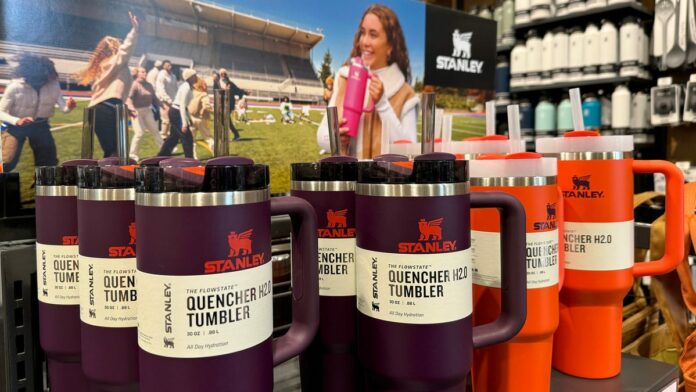Nvidia has been making waves this week during its GPU Technology Conference (GTC) in San Jose, California, debuting a new chip that has the world’s largest tech companies already queueing up.
But for those of us who don’t need and can’t afford the $30,000 to $40,000 chip, it looks like Nvidia has a more affordable — and useful for one’s practical, walking-around life.
Wall Street Journal reporter Meghan Bobrowsky shared a photo on X of an Nvidia-branded Stanley Quencher Tumbler for sale at the GTC Gear Store.
One of the items for sale at the GTC Gear Store: a $50 Nvidia-branded Stanley Quencher Tumbler #NVIDIAGTC pic.twitter.com/sific9BXTs
— Meghan Bobrowsky (@MeghanBobrowsky) March 19, 2024
The 40 oz. Nvidia-branded Stanley cup is $50 at the store — $5 more than the brand’s normal tumblers of the same size. Bobrowsky said in a follow-up post the tumblers “appear to have all sold out.”
Read more: Stanley Cups: Thirst-trapping the market — A Quartz Obsession
Neither Nvidia nor Stanley immediately responded to a Quartz request for comment on how the collaboration came about and if the Nvidia-branded cups will be sold outside of the conference.
Stanley tumblers have been all the rage on TikTok, workplaces, and pretty much everywhere over the past two years, with some die-hards even buying the cup’s accessories like backpacks and straw stoppers. The company’s projected annual sales for 2023 were $750 million, according to CNBC, and sales for the cups were up 275% year-over-year as of 2023, Retail Dive reported. In January, a limited edition “Galentine’s Collection” at Target sold out in minutes, and resellers were listing the cups on eBay for up to more than double the price.
However, the viral cups have come under scrutiny from former fans after discovering the cups have “some lead” in them. Stanley’s parent company, Pacific Market International (PIM) was sued in multiple class action lawsuits by customers accusing it of “negligent and/or intentional practice of misrepresenting and failing to fully disclose the presence of lead.” Stanley has confirmed on its website that during the manufacturing process, the material used to seal the vacuum insulation at the base of its products “includes some lead,” but that once it is sealed, it is “covered with a durable stainless steal layer, making it inaccessible to consumers.”
“Rest assured that no lead is present on the surface of any Stanley product that comes into contact with the consumer nor the contents of the product,” Stanley said, adding that if the seal is exposed, it is eligible for the company’s lifetime warranty.


